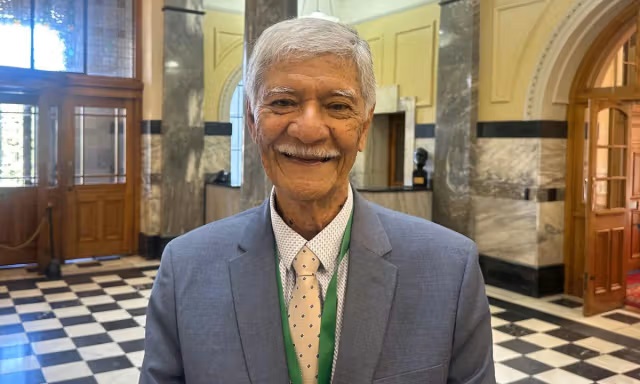The Speaker of the Niue Assembly says the recent referendum has significantly improved the role of the Parliamentary Select Committee.
Hima Douglas, who has served as Speaker since 2020, shared his insights into Niue’s parliamentary processes.
He said that although the referendum changes may appear minor, they have substantially impacted the parliamentary processes.
“As a result of that change, there have been some very significant improvements.
“We’re working slowly through it, but what it means practically is that the Auditor-General’s office can now help our Parliamentary Select Committee, which is the Public Accounts Committee.
“They can help our Public Accounts Committee focus their attention on the issues that we should be looking at in terms of holding the government to account, because that’s important.”
The referendum allowed Niueans to vote on four key bills proposing amendments to the Constitution.
Of these, only two passed: the change of the title of Premier to Prime Minister and the change of the name of the Audit Office to the Auditor-General.
With only 717 voters participating, concerns were raised about public engagement with both the referendum and the government.
Despite these concerns, Douglas believes that the electorate’s response was straightforward.
“I think essentially what happened was that some of the electorate says, ‘look, we elected you into the Parliament to rule the country on our behalf, and so if you’re going to change the Constitution, get on with it because that’s what we elected you in there to do’.
“But on the other hand, there are some very strict processes and procedures built into the Constitution to make it difficult for us to change our Constitution.
“If you make it easy, every government that comes in, a new government, would want to make changes to suit their own time in government.
“The constitution belongs to everybody on the island.”
When asked about efforts to inform the public ahead of the referendum, Douglas agreed that improvements should be made for future referendums, but he denied any bias.
“Select committees, particularly when it comes to the Constitution because these people have studied the changes. They know what to expect and its human nature.
“When you understand something better you tend to lean towards that side.”
Among the rejected proposals were calls to increase cabinet size and extend parliamentary terms.
Niue’s cabinet consists of four members, including the Prime Minister.
While the government argued that expansion was needed to address growing workloads, this did not resonate with voters.
“The proposal was that we increase the size of Cabinet by two more ministers.
“And the reason for that was the workload for the four ministers has doubled, tripled over time.
“And ministers are now required to do far more than what was anticipated back in 1974.
“When it went to the referendum, the electorate rejected it. They said, ‘no you just have to work a bit harder.’
Douglas acknowledged that insufficient explanation may have contributed to the rejection.
“I think part of the problem perhaps was that there was insufficient explanation to the people as to why there was a need to increase the number of cabinet ministers.
“There was no solid evidence to say, ‘okay, in a week, this is what we had to do.’ Or in a month, we spend so much time travelling and meeting our national and regional and international commitments.
“So much time was spent in doing this that we really needed some assistance and therefore the need to increase the numbers in Cabinet.”
Similarly, a proposal to extend parliamentary terms from three to four years was rejected, with voters pointing to New Zealand’s efficiency in governing within a three-year framework. This comparison, Douglas believes, isn’t entirely fair.
“Because of our close relationship with New Zealand, there’s a little saying in Niue that if New Zealand sneezes, Niue wipes its nose.
“So, anything that happens in New Zealand has a direct reflection on Niue.
“So, it’s natural when they look at the operation in New Zealand, and they say, ‘well, they’re a much, much bigger country. They can achieve in three years, so much. We’re a much, much smaller little island. Surely, we can achieve what we want to achieve in three years.’
“But I think the other point was that in all of our governments, when there’s a change in government, it is essentially the same people that govern the island for at least three or four terms.
“We’ve never had a government on the island where you only last three years and then you’re finished.”
The Speaker stressed the importance of public education in improving constitutional understanding, saying “We need to start at the schools… to explain how our system of government works.”
On the regional stage, Niue is actively engaged in initiatives related to climate change and gender equity.
However, Douglas warned against overextending resources
“We don’t want to become so committed that we forget we’ve got little problems at home to deal with at the same time.”
Reflecting on 50 years of self-governance, Douglas highlighted the continued need for responsible leadership and public engagement.
“Unless there’s a certain degree of economic independence, there can never be any proper political independence,” he explained, emphasising the need for a national discussion on finding a balance between external support and self-reliance.
As Niue looks ahead, the referendum results highlight the importance of clear communication, public education, and thoughtful reform.
For Douglas, these challenges represent an opportunity to strengthen the connection between leaders and citizens.
“All we need to do now is to encourage our people to cross that bridge and talk to each other.
“How exactly do we do that? I’m only a fisherman from Avatele, what do I know?” he said.













